人教版高中英语必修3 Unit 5 Canada – “The True North Grammar独立主格结构课件(28张PPT)
文档属性
| 名称 | 人教版高中英语必修3 Unit 5 Canada – “The True North Grammar独立主格结构课件(28张PPT) |  | |
| 格式 | zip | ||
| 文件大小 | 1.8MB | ||
| 资源类型 | 教案 | ||
| 版本资源 | 人教版(新课程标准) | ||
| 科目 | 英语 | ||
| 更新时间 | 2020-07-01 08:23:10 | ||
图片预览

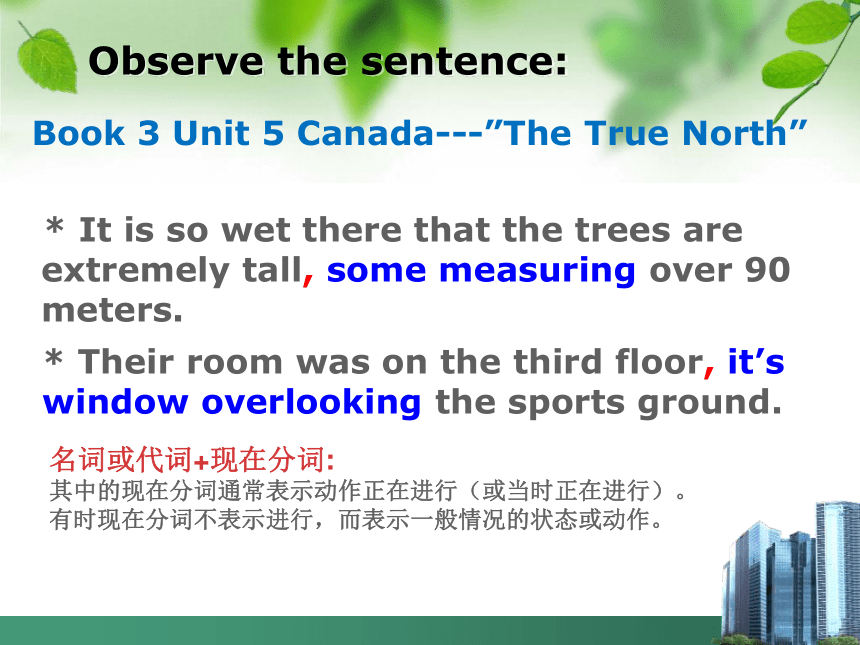
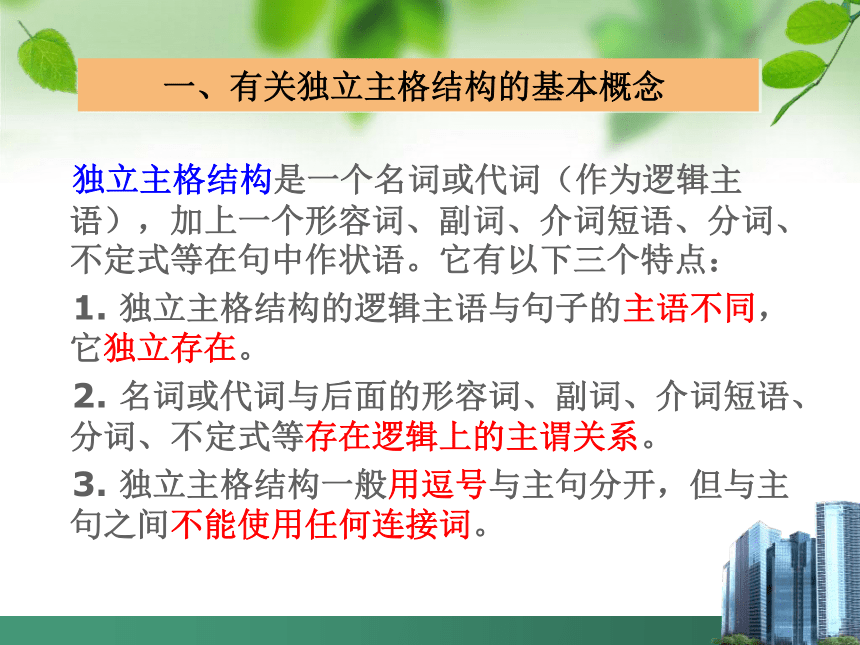
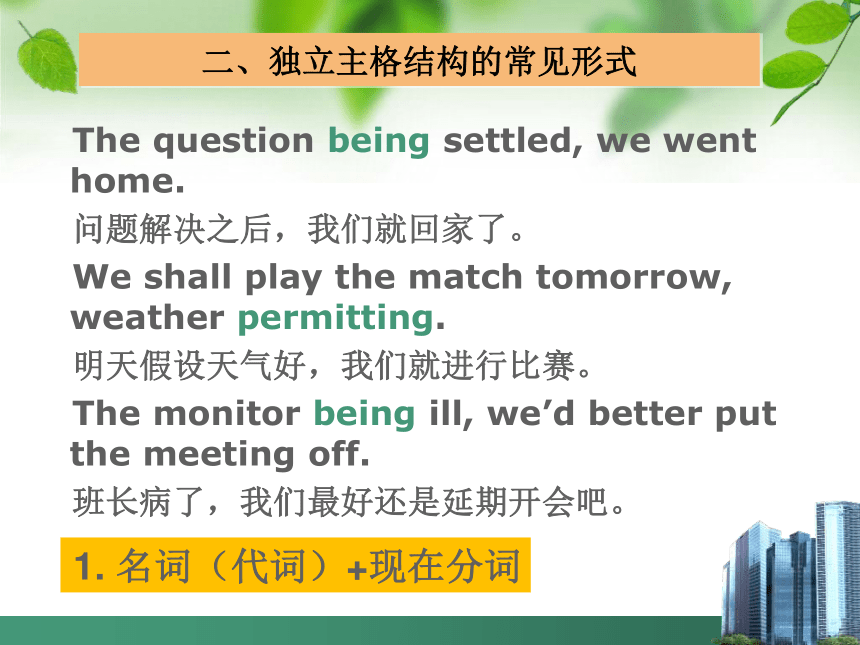


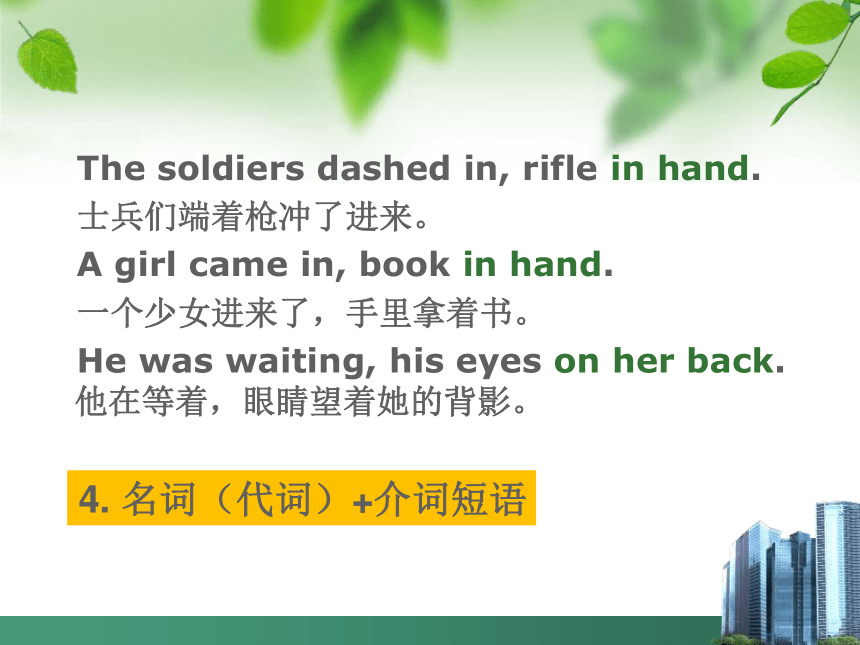
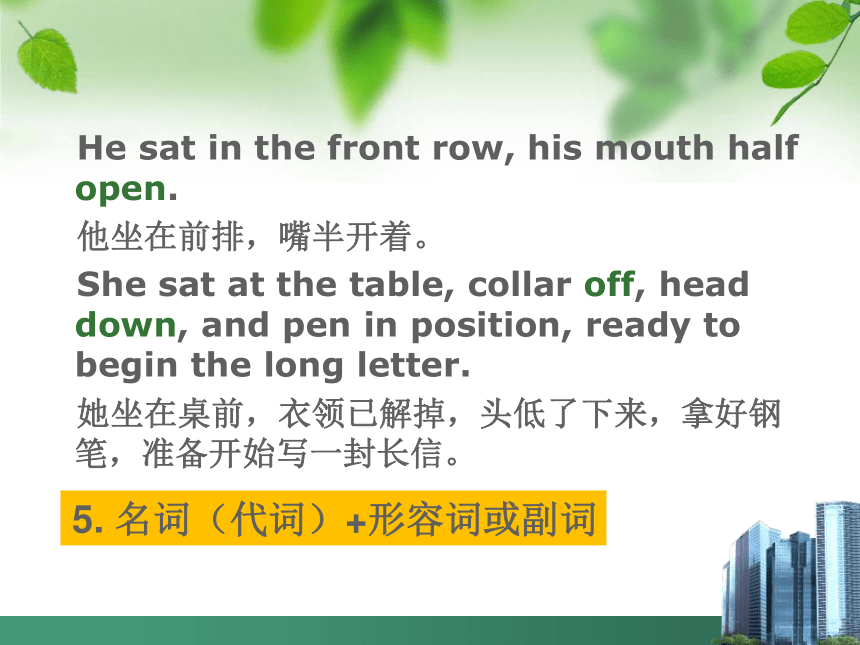

文档简介
(共28张PPT)
“…,some
measuring
90
meters”
独立主格结构的用法
(The
Independent
Genitive
Structure)
Observe
the
sentence:
Book
3
Unit
5
Canada---”The
True
North”
It
is
so
wet
there
that
the
trees
are
extremely
tall,
some
measuring
over
90
meters.
Their
room
was
on
the
third
floor,
it’s
window
overlooking
the
sports
ground.
名词或代词+现在分词:
其中的现在分词通常表示动作正在进行(或当时正在进行)。
有时现在分词不表示进行,而表示一般情况的状态或动作。
一、有关独立主格结构的基本概念?
独立主格结构是一个名词或代词(作为逻辑主语),加上一个形容词、副词、介词短语、分词、不定式等在句中作状语。它有以下三个特点:
1.
独立主格结构的逻辑主语与句子的主语不同,它独立存在。
2.
名词或代词与后面的形容词、副词、介词短语、分词、不定式等存在逻辑上的主谓关系。
3.
独立主格结构一般用逗号与主句分开,但与主句之间不能使用任何连接词。
二、独立主格结构的常见形式
The
question
being
settled,
we
went
home.
问题解决之后,我们就回家了。
We
shall
play
the
match
tomorrow,
weather
permitting.
明天假设天气好,我们就进行比赛。
The
monitor
being
ill,
we’d
better
put
the
meeting
off.
班长病了,我们最好还是延期开会吧。
1.
名词(代词)+现在分词
The
job
finished,
we
went
home.
工作结束后我们就回家了。
The
last
bus
having
gone,
we
had
to
walk
home.
最后一班公车已经走了,我们必须走路回家。
More
time
given,
we
should
have
done
the
job
much
better.
如果给我们更多的时间,我们会把工作做得更好。
2.
名词(代词)+过去分词
Nobody
to
come
tomorrow,
we
will
have
to
put
off
the
meeting
till
next
week.
如果明天没有人来,我们将把会议推迟到下周。
So
many
people
to
help
him,
he
is
sure
to
succeed.
有如此多的人来帮助他,他一定会成功的。
3.
名词(代词)+不定式
The
soldiers
dashed
in,
rifle
in
hand.
士兵们端着枪冲了进来。
A
girl
came
in,
book
in
hand.
一个少女进来了,手里拿着书。
He
was
waiting,
his
eyes
on
her
back.
他在等着,眼睛望着她的背影。
4.
名词(代词)+介词短语
He
sat
in
the
front
row,
his
mouth
half
open.
他坐在前排,嘴半开着。
She
sat
at
the
table,
collar
off,
head
down,
and
pen
in
position,
ready
to
begin
the
long
letter.
她坐在桌前,衣领已解掉,头低了下来,拿好钢笔,准备开始写一封长信。
5.
名词(代词)+形容词或副词
There
being
nothing
else
to
do,
we
went
home.
没有别的事可做,我们就回家了。
There
being
no
further
business,
I
declare
the
meeting
closed.
没有再要讨论的事了,我宣布散会。
6.
There
being
+名词(代词)
It
being
Christmas,
the
government
offices
were
closed.
由于圣诞节的缘故,政府机关都休息。
It
being
a
holiday,
all
the
shops
were
shut.
由于今天是假日,所有商店都关门了。
7.
It
being
+名词(代词)
Don’t
sleep
with
the
windows
open.
别开着窗睡觉。
He
stood
before
his
teacher
with
his
head
down.
他低着头站在老师面前。
He
was
lying
on
the
bed
with
all
his
clothes
on.
他和衣躺在床上。
She
came
in
with
a
book
in
her
hand.
她手里拿着一本书走了进来。
He
fell
asleep
with
the
lamp
burning.
他没熄灯就睡着了。
注:独立主格结构有时可在其前加上介词with。
三、独立主格结构的句法功能
独立主格结构在句子中作状语,表示时间、原因、条件和伴随等情况。
1.
作时间状语
School
over,
the
students
went
home.
放学后,学生们都回家了。
The
ceremony
ended,
the
games
began.
仪式结束后,比赛开始了。
2.
作条件状语
It
being
fine
tomorrow,
we’ll
go
boating.
如果明天天气好的话,我们就去划船。
Li
Lei
coming,
it
is
not
necessary
to
ask
Wu
Dong.
如果李蕾来的话,就没有必要叫吴东了。
3.
作原因状语
The
meeting
being
put
off,
we
needn’t
hurry.
由于会议推迟了,我们就没有必要匆忙了。
Mr.
Li
being
ill,
Miss
Yang
will
give
us
this
lesson
instead.
李老师病了,杨老师将代他来给我们上这堂课。
4.
作伴随状语
Mr.
Li
comes
here
with
a
book
in
his
hand.
李先生手里拿着书过来了。
A
smile
on
her
face,
she
asked
what
she
could
do
for
us.
她面带微笑问道我们要什么。
5.
表示补充说明
A
hunter
came
in,
his
face
red
with
cold
(=and
his
face
was
red
with
cold).
一个猎人走了进来,他的脸冻得通红。
We
redoubled
our
efforts,
each
man
working
like
two.
我们加倍努力,一个人干两个人的活。
四、使用独立主格结构的几点注意
1.
独立主格与状语从句的转换
当状语从句的主语与主句的主语不是指同一个对象时,可用独立主格结构取代状语从句,但不再保留连词。如:
After
class
was
over
(=Class
being
over
/
Class
over),
the
students
soon
left
the
classroom.
下课后,学生很快离开了教室。
2.
不能省略being
(having
been)的情形
在下列两种情况下,独立主格结构中的being(或having
been)不能省略:
(1)
独立主格的逻辑主语是代词时。如:
It
being
Sunday,
we
went
to
church.
因为是星期天,我们去做礼拜。
(2)
在There
being+名词的结构中。如:
There
being
no
bus,
we
had
to
go
home
on
foot.
因为没有公共汽车,所以我们不得不步行回家。
3.
通常不用物主代词或冠词
在“名词(或代词)+介词短语”构成的独立主格结构中,一般不用形容词性物主代词和冠词。如:
Mr.
Smith
entered
the
classroom,
book
in
hand.
史密斯先生走进了课室,手里拿着一本书。
比较with的复合结构:
Mr.
Smith
entered
the
classroom
with
a
book
in
his
hand.
4.
独立主格结构没有所有格形式
The
chief-editor
arriving,
we
began
the
meeting.
主编来了,我们开始开会。
比较动名词复合结构:
The
chief-editor’s
arriving
made
us
very
surprised.
?
5.
独立主格的时态问题
独立主格结构作时间或原因状语时,可用完成时,表示该动作发生在谓语之前。如:
The
listeners
having
taken
their
seats,
the
concert
began.
听众坐好后,音乐会开始了。
Tom
having
been
late
over
and
over,
his
boss
was
very
disappointed.
由于汤姆一再迟到,他的老板非常失望。
Exercises
1.
I
send
you
100
dollars
today,
the
rest
_________
in
a
year.
follows
B.
followed
C.
to
follow
D.
being
followed
2.
All
things
_________,
I
think
we
ought
to
give
the
job
to
George.
considered?
B.
considering
C.
to
consider
D.
being
considered
3.
The
river
_________
in
the
night,
the
crossing
was
impossible.
to
rise
B.
rose
C.
having
risen
D.
being
risen
4.
More
time
_________,
we
should
have
done
the
job
much
better.
to
give
B.
give
C.
being
given
D.
given
5.
We
shall
play
the
match
tomorrow,
weather
_________.
permits
B.
permitting
C.
to
permit
D.
permitted
6.
The
monitor
_________
ill,
we’d
better
put
the
meeting
off.
being
B.
to
be
C.
been
D.
to
have
been
7.
An
important
lecture
_________
given
tomorrow,
the
professor
has
to
stay
up
late
into
the
night.
to
be
B.
being
C.
been
D.
to
have
been
8.
He
was
lying
on
the
grass,
his
hands
_________
under
his
head.
to
cross
B.
crossed
C.
crossing
D.
to
be
crossing
9.
Tom
_________
late
over
and
over,
his
boss
was
very
disappointed.
having
been?
B.
been
C.
to
be
D.
to
being
10.
Other
things
_________
equal,
I
would
buy
the
black
dress
not
the
white
one.
being
B.
to
be
C.
been
D.
having
been
Thank
you!
“…,some
measuring
90
meters”
独立主格结构的用法
(The
Independent
Genitive
Structure)
Observe
the
sentence:
Book
3
Unit
5
Canada---”The
True
North”
It
is
so
wet
there
that
the
trees
are
extremely
tall,
some
measuring
over
90
meters.
Their
room
was
on
the
third
floor,
it’s
window
overlooking
the
sports
ground.
名词或代词+现在分词:
其中的现在分词通常表示动作正在进行(或当时正在进行)。
有时现在分词不表示进行,而表示一般情况的状态或动作。
一、有关独立主格结构的基本概念?
独立主格结构是一个名词或代词(作为逻辑主语),加上一个形容词、副词、介词短语、分词、不定式等在句中作状语。它有以下三个特点:
1.
独立主格结构的逻辑主语与句子的主语不同,它独立存在。
2.
名词或代词与后面的形容词、副词、介词短语、分词、不定式等存在逻辑上的主谓关系。
3.
独立主格结构一般用逗号与主句分开,但与主句之间不能使用任何连接词。
二、独立主格结构的常见形式
The
question
being
settled,
we
went
home.
问题解决之后,我们就回家了。
We
shall
play
the
match
tomorrow,
weather
permitting.
明天假设天气好,我们就进行比赛。
The
monitor
being
ill,
we’d
better
put
the
meeting
off.
班长病了,我们最好还是延期开会吧。
1.
名词(代词)+现在分词
The
job
finished,
we
went
home.
工作结束后我们就回家了。
The
last
bus
having
gone,
we
had
to
walk
home.
最后一班公车已经走了,我们必须走路回家。
More
time
given,
we
should
have
done
the
job
much
better.
如果给我们更多的时间,我们会把工作做得更好。
2.
名词(代词)+过去分词
Nobody
to
come
tomorrow,
we
will
have
to
put
off
the
meeting
till
next
week.
如果明天没有人来,我们将把会议推迟到下周。
So
many
people
to
help
him,
he
is
sure
to
succeed.
有如此多的人来帮助他,他一定会成功的。
3.
名词(代词)+不定式
The
soldiers
dashed
in,
rifle
in
hand.
士兵们端着枪冲了进来。
A
girl
came
in,
book
in
hand.
一个少女进来了,手里拿着书。
He
was
waiting,
his
eyes
on
her
back.
他在等着,眼睛望着她的背影。
4.
名词(代词)+介词短语
He
sat
in
the
front
row,
his
mouth
half
open.
他坐在前排,嘴半开着。
She
sat
at
the
table,
collar
off,
head
down,
and
pen
in
position,
ready
to
begin
the
long
letter.
她坐在桌前,衣领已解掉,头低了下来,拿好钢笔,准备开始写一封长信。
5.
名词(代词)+形容词或副词
There
being
nothing
else
to
do,
we
went
home.
没有别的事可做,我们就回家了。
There
being
no
further
business,
I
declare
the
meeting
closed.
没有再要讨论的事了,我宣布散会。
6.
There
being
+名词(代词)
It
being
Christmas,
the
government
offices
were
closed.
由于圣诞节的缘故,政府机关都休息。
It
being
a
holiday,
all
the
shops
were
shut.
由于今天是假日,所有商店都关门了。
7.
It
being
+名词(代词)
Don’t
sleep
with
the
windows
open.
别开着窗睡觉。
He
stood
before
his
teacher
with
his
head
down.
他低着头站在老师面前。
He
was
lying
on
the
bed
with
all
his
clothes
on.
他和衣躺在床上。
She
came
in
with
a
book
in
her
hand.
她手里拿着一本书走了进来。
He
fell
asleep
with
the
lamp
burning.
他没熄灯就睡着了。
注:独立主格结构有时可在其前加上介词with。
三、独立主格结构的句法功能
独立主格结构在句子中作状语,表示时间、原因、条件和伴随等情况。
1.
作时间状语
School
over,
the
students
went
home.
放学后,学生们都回家了。
The
ceremony
ended,
the
games
began.
仪式结束后,比赛开始了。
2.
作条件状语
It
being
fine
tomorrow,
we’ll
go
boating.
如果明天天气好的话,我们就去划船。
Li
Lei
coming,
it
is
not
necessary
to
ask
Wu
Dong.
如果李蕾来的话,就没有必要叫吴东了。
3.
作原因状语
The
meeting
being
put
off,
we
needn’t
hurry.
由于会议推迟了,我们就没有必要匆忙了。
Mr.
Li
being
ill,
Miss
Yang
will
give
us
this
lesson
instead.
李老师病了,杨老师将代他来给我们上这堂课。
4.
作伴随状语
Mr.
Li
comes
here
with
a
book
in
his
hand.
李先生手里拿着书过来了。
A
smile
on
her
face,
she
asked
what
she
could
do
for
us.
她面带微笑问道我们要什么。
5.
表示补充说明
A
hunter
came
in,
his
face
red
with
cold
(=and
his
face
was
red
with
cold).
一个猎人走了进来,他的脸冻得通红。
We
redoubled
our
efforts,
each
man
working
like
two.
我们加倍努力,一个人干两个人的活。
四、使用独立主格结构的几点注意
1.
独立主格与状语从句的转换
当状语从句的主语与主句的主语不是指同一个对象时,可用独立主格结构取代状语从句,但不再保留连词。如:
After
class
was
over
(=Class
being
over
/
Class
over),
the
students
soon
left
the
classroom.
下课后,学生很快离开了教室。
2.
不能省略being
(having
been)的情形
在下列两种情况下,独立主格结构中的being(或having
been)不能省略:
(1)
独立主格的逻辑主语是代词时。如:
It
being
Sunday,
we
went
to
church.
因为是星期天,我们去做礼拜。
(2)
在There
being+名词的结构中。如:
There
being
no
bus,
we
had
to
go
home
on
foot.
因为没有公共汽车,所以我们不得不步行回家。
3.
通常不用物主代词或冠词
在“名词(或代词)+介词短语”构成的独立主格结构中,一般不用形容词性物主代词和冠词。如:
Mr.
Smith
entered
the
classroom,
book
in
hand.
史密斯先生走进了课室,手里拿着一本书。
比较with的复合结构:
Mr.
Smith
entered
the
classroom
with
a
book
in
his
hand.
4.
独立主格结构没有所有格形式
The
chief-editor
arriving,
we
began
the
meeting.
主编来了,我们开始开会。
比较动名词复合结构:
The
chief-editor’s
arriving
made
us
very
surprised.
?
5.
独立主格的时态问题
独立主格结构作时间或原因状语时,可用完成时,表示该动作发生在谓语之前。如:
The
listeners
having
taken
their
seats,
the
concert
began.
听众坐好后,音乐会开始了。
Tom
having
been
late
over
and
over,
his
boss
was
very
disappointed.
由于汤姆一再迟到,他的老板非常失望。
Exercises
1.
I
send
you
100
dollars
today,
the
rest
_________
in
a
year.
follows
B.
followed
C.
to
follow
D.
being
followed
2.
All
things
_________,
I
think
we
ought
to
give
the
job
to
George.
considered?
B.
considering
C.
to
consider
D.
being
considered
3.
The
river
_________
in
the
night,
the
crossing
was
impossible.
to
rise
B.
rose
C.
having
risen
D.
being
risen
4.
More
time
_________,
we
should
have
done
the
job
much
better.
to
give
B.
give
C.
being
given
D.
given
5.
We
shall
play
the
match
tomorrow,
weather
_________.
permits
B.
permitting
C.
to
permit
D.
permitted
6.
The
monitor
_________
ill,
we’d
better
put
the
meeting
off.
being
B.
to
be
C.
been
D.
to
have
been
7.
An
important
lecture
_________
given
tomorrow,
the
professor
has
to
stay
up
late
into
the
night.
to
be
B.
being
C.
been
D.
to
have
been
8.
He
was
lying
on
the
grass,
his
hands
_________
under
his
head.
to
cross
B.
crossed
C.
crossing
D.
to
be
crossing
9.
Tom
_________
late
over
and
over,
his
boss
was
very
disappointed.
having
been?
B.
been
C.
to
be
D.
to
being
10.
Other
things
_________
equal,
I
would
buy
the
black
dress
not
the
white
one.
being
B.
to
be
C.
been
D.
having
been
Thank
you!
同课章节目录
